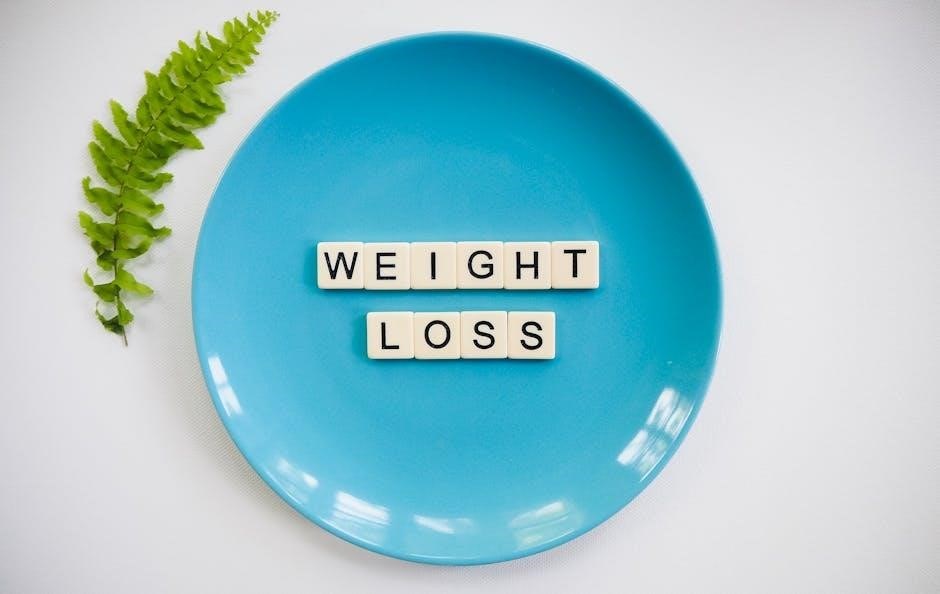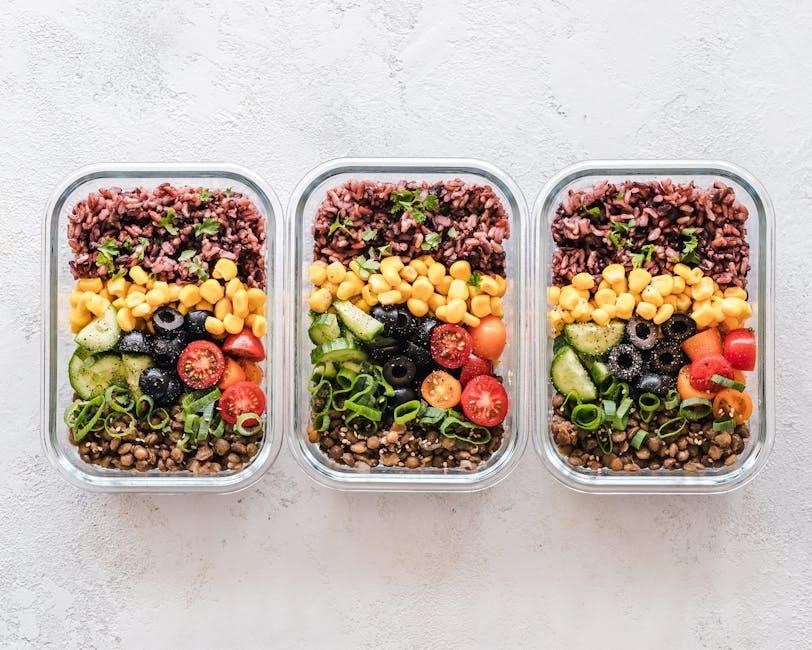
printable menopause diet plan pdf
A printable menopause diet plan PDF offers a structured approach to managing symptoms and supporting overall health during this transition. It provides balanced meal ideas, weight loss strategies, and symptom relief through nutrition.
Understanding the Importance of Nutrition During Menopause
Nutrition plays a vital role in managing menopause symptoms and supporting overall health. A balanced diet helps maintain hormonal balance, reduces the risk of chronic diseases, and supports bone health. Key nutrients like calcium, vitamin D, and omega-3 fatty acids are essential for preventing osteoporosis and managing weight gain. A well-structured meal plan can alleviate symptoms such as hot flashes and night sweats, while also promoting long-term well-being. Prioritizing whole foods, anti-inflammatory ingredients, and proper hydration is crucial during this phase.

Key Components of a Menopause Diet Plan
A menopause diet plan focuses on balanced nutrition, hormone balance, and metabolism support. It includes essential nutrients, anti-inflammatory foods, and strategies for managing weight and bone health effectively.
Foods That Support Hormone Balance
Leafy greens like kale and spinach, cruciferous vegetables such as broccoli, and fatty fish rich in omega-3s support hormone balance. Sweet potatoes and other fiber-rich foods help stabilize blood sugar and insulin levels, reducing hormonal fluctuations. Incorporating these into your diet can aid in managing menopause symptoms like weight gain and hot flashes, promoting overall well-being.
Nutrients Essential for Bone Health
Calcium and vitamin D are crucial for maintaining bone density, especially during menopause. Foods like dairy, leafy greens, and fortified products are rich in these nutrients. Magnesium and vitamin K also play key roles in bone mineralization. Incorporating these into your diet can help prevent osteoporosis and fractures. A printable menopause diet plan PDF often includes recipes and shopping lists tailored to boost bone health, ensuring you meet daily nutrient needs for long-term skeletal strength and overall wellness.

Benefits of a Structured Menopause Diet Plan
A structured menopause diet plan helps manage symptoms like weight gain and hot flashes while supporting metabolism and overall health. It provides balanced nutrition and practical meal guidance.
Weight Management and Metabolism Support
A printable menopause diet plan PDF focuses on balancing nutrition to support weight management and metabolism. It includes meals that stabilize blood sugar levels and provide essential nutrients. By emphasizing hormone-balancing foods, the plan helps maintain a healthy metabolism, reducing the risk of weight gain during menopause. With portion control and nutrient-rich recipes, it promotes sustainable weight loss without extreme restrictions, ensuring long-term success and overall well-being.
Alleviating Common Menopause Symptoms

A printable menopause diet plan PDF emphasizes foods that reduce common symptoms like hot flashes and night sweats. By incorporating anti-inflammatory and hormone-balancing meals, it helps stabilize hormones and alleviate discomfort. The plan includes recipes rich in omega-3s, fiber, and antioxidants, which support overall well-being. Balanced nutrition also aids in managing mood swings and energy levels, promoting a smoother transition through menopause with tailored dietary solutions.

Creating a Personalized Printable Menopause Diet Plan

A personalized printable menopause diet plan allows women to tailor meals to their specific needs, ensuring balanced nutrition and symptom relief. It provides customizable templates for long-term success.
Steps to Customize Your Diet Plan
To create a personalized menopause diet plan, start by assessing your nutritional needs and health goals. Choose meals that align with your preferences and lifestyle, ensuring balanced nutrition. Incorporate hormone-balancing foods like leafy greens and healthy fats, and adjust portion sizes based on activity levels. Consider consulting a healthcare provider to tailor the plan further. Regularly review and update the diet to reflect changes in symptoms or weight management needs, ensuring long-term success and symptom relief.
Using a 7-Day Meal Plan Template
A 7-day meal plan template offers a convenient way to organize meals, ensuring variety and nutrient balance. It includes breakfast, lunch, dinner, and snack options, with recipes and portion sizes tailored for menopause health. The template often features hormone-supporting foods, anti-inflammatory ingredients, and metabolism-boosting meals. By following this structured plan, women can manage symptoms, maintain weight, and improve overall well-being. Downloadable PDF versions make it easy to print and stick to the plan consistently, promoting long-term health benefits and symptom relief.

Important Nutrients for Menopause Health
Critical nutrients include calcium, vitamin D, omega-3 fatty acids, and fiber, which support bone health, reduce inflammation, and promote overall well-being during menopause.

Role of Calcium and Vitamin D
Calcium and vitamin D are essential for maintaining bone health during menopause, as hormonal changes increase the risk of osteoporosis. Calcium-rich foods like dairy, leafy greens, and fortified products should be prioritized. Vitamin D aids in calcium absorption and can be obtained through sunlight, fatty fish, and supplements. Ensuring adequate intake of these nutrients supports bone density, reducing the risk of fractures and promoting overall well-being during this critical life phase.
Incorporating Anti-Inflammatory Foods
Incorporating anti-inflammatory foods into your menopause diet plan is crucial for reducing inflammation, a key contributor to menopause symptoms. Foods like berries, leafy greens, and fatty fish rich in omega-3s help alleviate symptoms such as hot flashes and joint pain. A Mediterranean-style diet, emphasizing whole grains, legumes, and healthy fats, further supports overall health. These foods not only combat inflammation but also promote hormonal balance and long-term well-being during menopause.
Exercise and Lifestyle Adjustments
Regular physical activity, such as yoga or walking, supports menopause health by improving symptoms and overall well-being. Pairing exercise with a balanced diet enhances weight management and energy levels.
Physical Activity Recommendations
Regular exercise, such as yoga or brisk walking, is essential for managing menopause symptoms. Strength training and aerobic activities improve bone density and cardiovascular health. Aim for at least 150 minutes of moderate exercise weekly to support weight management and energy levels. Incorporating physical activity into your routine can also help alleviate stress and improve mood. Pairing exercise with a balanced diet enhances overall well-being and supports long-term health during menopause.
Stress Management Techniques
Stress management is crucial during menopause to alleviate symptoms like mood swings and anxiety. Techniques such as yoga, meditation, and deep breathing can help reduce stress levels. Engaging in activities like walking in nature or practicing mindfulness can also promote emotional well-being. Additionally, connecting with support groups or following structured stress-relief programs can provide guidance and community support, helping women navigate this transition with greater ease and confidence.

Hormone-Balancing Foods to Include
Incorporate leafy greens, cruciferous vegetables, and healthy fats like avocados and omega-3-rich fish to support hormonal balance and alleviate menopause symptoms naturally.
Leafy Greens and Cruciferous Vegetables
Leafy greens like kale and spinach, along with cruciferous vegetables such as broccoli and Brussels sprouts, are rich in phytochemicals and antioxidants. These foods support hormone balance and may reduce menopause symptoms. Incorporating them into your diet can help stabilize estrogen levels and promote overall well-being. Aim for 2-3 servings daily, adding them to salads, smoothies, or as side dishes for balanced nutrition during this transition.
Healthy Fats and Omega-3 Sources
Healthy fats and omega-3s are essential for hormone balance and reducing inflammation during menopause. Include avocados, nuts, seeds, olive oil, and fatty fish like salmon or flaxseeds in your diet. These foods support heart health and brain function while aiding in symptom relief. Aim for 1-2 servings of fatty fish weekly and incorporate plant-based fats daily. Portion control is key to maintaining weight management and overall well-being during this transition.
Meal Prepping and Planning Tips
Plan meals weekly, using a grocery list to ensure balanced nutrition. Prep ingredients or full meals in advance to save time and maintain healthy eating habits consistently.
Grocery Shopping Lists and Recipes
A printable menopause diet plan PDF includes detailed grocery lists and simple, nutrient-rich recipes. Focus on hormone-balancing foods like leafy greens, lean proteins, and healthy fats. Recipes emphasize anti-inflammatory ingredients and calcium-rich options to support bone health. meal plans are designed to maintain stable blood sugar levels and promote weight management. Each recipe is crafted to be easy to prepare, ensuring long-term adherence to a balanced diet tailored for menopausal health.
Preparing Meals for Long-Term Success
Preparing meals for long-term success involves meal prepping, portion control, and using a 7-day meal plan template. Focus on nutrient-dense foods like leafy greens, lean proteins, and whole grains. Incorporate anti-inflammatory ingredients and healthy fats to support hormonal balance. Meal prep ensures consistency, making it easier to stick to your diet plan. Balanced nutrition helps manage weight, improve energy, and alleviate symptoms, promoting overall well-being during menopause.
A printable menopause diet plan PDF provides a clear roadmap for managing symptoms and improving health. Balanced nutrition and sustainable lifestyle changes support long-term wellness and hormonal balance.
Maintaining a Healthy Lifestyle During Menopause
A printable menopause diet plan PDF helps women adopt a balanced approach to nutrition, exercise, and stress management. By focusing on hormone-balancing foods, regular physical activity, and mindfulness practices like yoga or meditation, women can maintain energy levels, support bone health, and reduce symptoms. Incorporating these habits into daily routines fosters long-term wellness and empowers women to navigate menopause with confidence and vitality, ensuring a healthier, more vibrant life.